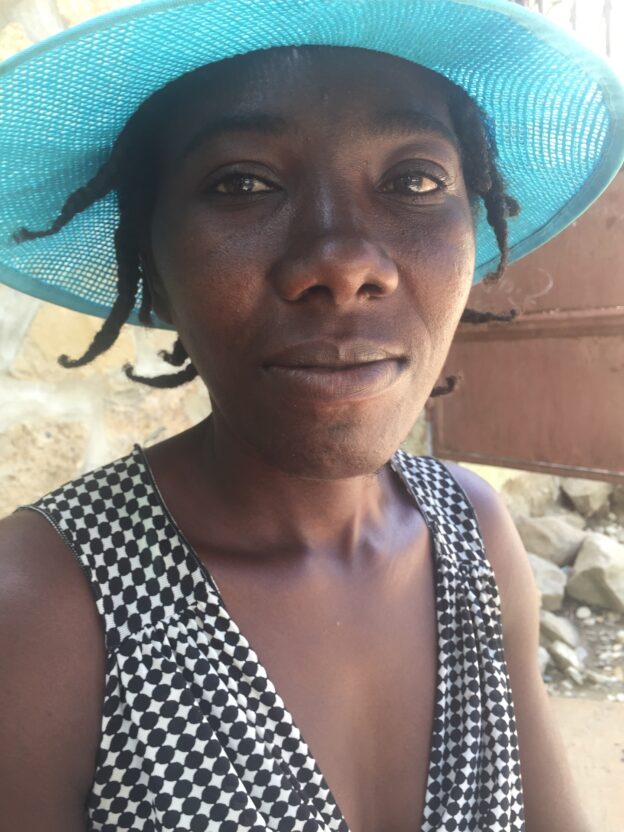Dieumercie lives in Palmarik, a small neighborhood within Kay Epen, a minor population center in a remote corner of southern Tomond. She’s lived in the area all her life, and now shares a home with her partner and their five children.
When she joined the CLM program, she had nothing. She describes regular seizures she suffered over the course of years and how she spent all her money on doctors and traditional practitioners, looking for a solution. She supported her children with the little bit of farming she could manage. Her husband was never much help. “Msye a mòl.” That means that the guy is lazy. She even left him for a time, returning to her mother’s home in frustration. But they have five children, so it’s hard to stay away for good.
When she joined the program, she chose two goats and a pig. But further conversation with her case manager, Ricot, led her to change her decision. At the time, disease was killing of many of the pigs in her neighborhood, and she didn’t want to acquire one just to watch it die. So she asked Ricot to buy a third goat instead. They agreed that when the epidemic had passed she would sell one of the goats to buy a pig.
But once she has resources in her hands, Dieumercie is good at managing them. Using savings from her weekly stipend, she bought a small pig without having to sell a goat. Meanwhile, the goats gave her two kids.
She took good care of her pig, but even so it began to show signs of sickness. So she sold it and a goat and used the money to buy a cow still in its mother’s womb. This way of buying a cow entails some risk, but it is much less expensive than buying a calf would be. When a healthy bull was born shortly after her purchase, Dieumercie knew that the risk had been worth it.
And she managed to save up to buy the pig even while she was contributing to her savings club, or sòl, every week. When her turn came, it paid out 2100 gourds, which she used to buy trees to make charcoal. She began a cycle of buying wood and selling charcoal that quickly increased the value of her investment. Before long, she sold out the business and bought a second unborn calf. When its mother gave birth, she had a small heifer to go with her bull. “It used to be that I couldn’t have gotten even a small loan if I needed one. Now plenty of people are ready to lend me money. They see I can pay it back.”
Though her status in the community has changed, however, and she has begun to accumulate valuable assets, other parts of her life are still a struggle. Her very status can worry her. Her calves aren’t ready to be weaned yet, but when they are she’ll have to figure out how to take care of them. She’s afraid to keep them in her neighborhood. “There’s a lot of jealousy. People hate to see you get ahead.”
She still depends largely on her farming to feed her children. The obvious alternative would be to get into small commerce. Her experience with charcoal at least suggests that she’d be good at it. But she’s hesitant. “It’s hard to maintain small commerce because the children require so many little expenses.” And school expenses are increasing. Not only do the prices rise every year, but each new, higher class is more expensive than the previous one. Her costs would thus be increasing even without inflation. “I’ll just have to keep seeing how I can handle it.”
And she’s not sure she wants to stay with her husband, who still isn’t helping out. She used the resources CLM provided to repair her mother’s house. That’s where she was staying at the time the repairs we made. And she made sure to turn the two-room house into a three-room one, so she would always have a place there. Her oldest boy is 15, and he is starting to understand the situation between his parents well. “He says he’ll support me whatever I decide.”
Despite her struggles, Dieumercie is now confident. “I’ve learned that I can take care of my children as long as I can stay healthy.”
